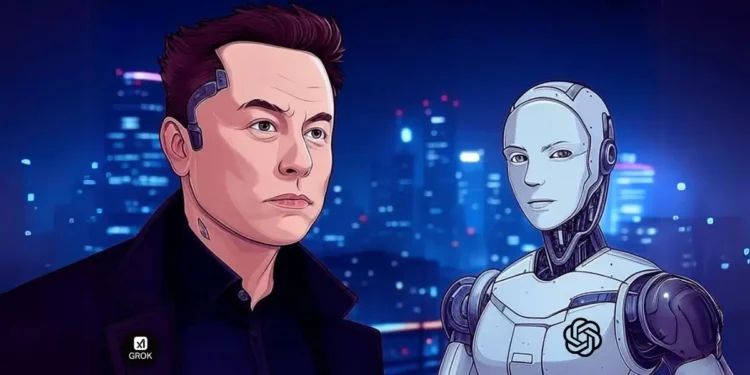The rise of technology has made artificial intelligence (AI) a topic that receives wide discussion, along with serious debates across various domains. Due to its transformative abilities, which challenge multiple sectors and its ethical dilemmas, artificial intelligence becomes a central point of examination for the audience that both supports its advancement and opposes it. The core of this dialogue reveals an intriguing yet hostile bond between OpenAI and Elon Musk. The upcoming fight over artificial intelligence’s future represents what sets of risks.
This article investigates the intricate relationship between OpenAI and Elon Musk through the examination of vital matters and resulting circumstances.
The Origins of OpenAI and Elon Musk’s Involvement
To understand the current dynamics between OpenAI and Elon Musk, it’s essential to look back at their origins. OpenAI was founded in 2015 with a mission to ensure that artificial intelligence benefits all of humanity.
Elon Musk was one of the early investors and board members of OpenAI, driven by his vision of creating AI that is safe and beneficial for society. However, his departure from the company in 2018 marked the beginning of a more complex relationship. Why did Elon Musk leave OpenAI? This question has been the subject of much speculation, with some suggesting it was due to conflicts of interest with his other ventures, such as Tesla.
The Diverging Paths: OpenAI’s Evolution and Musk’s Criticisms
Since Musk’s departure, OpenAI has made significant strides in the field of AI, particularly with the development of advanced language models like GPT-3 and GPT-4. These models have demonstrated remarkable capabilities in natural language processing, generating human-like text, and solving complex problems. How has OpenAI’s technology advanced since Elon Musk left? The answer lies in the company’s relentless focus on research and development, pushing the boundaries of what AI can achieve.
However, Musk has remained vocal about his concerns regarding AI, often criticizing OpenAI’s approach. He has warned about the potential dangers of unregulated AI development, emphasizing the need for caution and ethical considerations. What are Elon Musk’s main concerns about AI? His primary fears revolve around the possibility of AI becoming uncontrollable and posing existential risks to humanity. This perspective has led to a public discourse where Musk’s cautionary stance contrasts sharply with OpenAI’s more optimistic outlook.
The Role of Ethics in AI Development
One of the most critical aspects of the AI debate is the role of ethics. As AI systems become more powerful, ensuring they are developed and used responsibly is paramount. How can we ensure that AI is developed ethically? OpenAI has taken steps to address this issue, implementing guidelines and principles to guide their research. They emphasize transparency, collaboration, and a commitment to using AI for the greater good.
On the other hand, Elon Musk has been a strong advocate for government regulation of AI. He believes that without proper oversight, the risks associated with advanced AI could spiral out of control. What kind of regulations does Elon Musk propose for AI? His suggestions include strict guidelines on AI development, mandatory safety checks, and international cooperation to ensure a unified approach to AI governance.
The Future of AI: Collaboration or Competition?
As we look to the future, the relationship between OpenAI and Elon Musk will undoubtedly continue to shape the trajectory of AI development. While there are clear differences in their approaches, there is also potential for collaboration. Can OpenAI and Elon Musk work together for the future of AI? Some experts argue that combining OpenAI’s technical expertise with Musk’s visionary perspective could lead to groundbreaking advancements that prioritize both innovation and safety.
However, the competitive nature of the AI industry cannot be ignored. Both OpenAI and companies associated with Elon Musk, such as Neuralink, are racing to achieve breakthroughs in AI. This competition can drive rapid progress, but it also raises concerns about the potential for shortcuts and ethical compromises. How can we balance competition and ethical considerations in AI? Striking this balance will be crucial in ensuring that AI develops in a way that benefits everyone.
The Impact on Society: Jobs, Economy, and Beyond
The implications of AI extend far beyond the tech industry, affecting every aspect of society. One of the most pressing concerns is the impact on employment. As AI systems become more capable, there is a fear that many jobs could be automated, leading to widespread unemployment. How will AI affect the job market? Studies have shown that while some jobs will indeed be displaced, new opportunities will also emerge. The key will be in reskilling and adapting the workforce to thrive in an AI-driven economy.
Economically, AI has the potential to drive significant growth and innovation. Companies that effectively integrate AI into their operations are likely to gain a competitive edge. What are the economic benefits of AI? Increased efficiency, improved decision-making, and the creation of new products and services are just a few of the ways AI can boost economic performance.
The Role of Education and Public Awareness
As AI becomes more prevalent, the importance of education and public awareness cannot be overstated. Understanding the basics of AI and its potential impacts is crucial for everyone, from policymakers to the general public. How can we educate people about AI? Initiatives such as AI workshops and online courses can play a vital role in demystifying AI and empowering individuals to engage in informed discussions.
Moreover, fostering a culture of curiosity and critical thinking is essential. Encouraging people to ask questions and challenge assumptions about AI can lead to a more thoughtful and balanced approach to its development and use. What questions should we be asking about AI? Some important ones include: How can we ensure AI is used for good? What are the long-term societal impacts of AI? And how can we prepare for the changes AI will bring?
Conclusion
The battle between OpenAI and Elon Musk over the future of artificial intelligence is a microcosm of the broader conversation happening globally. It highlights the tensions between innovation and caution, optimism and skepticism. As we navigate this complex landscape, we must approach AI with both enthusiasm and responsibility.
What can you do to contribute to the future of AI? Whether you’re a tech enthusiast, a concerned citizen, or a decision-maker, your voice matters.
By staying informed, engaging in discussions, and supporting initiatives that promote ethical AI development, you can help shape a future where AI benefits all of humanity.
We invite you to join the conversation by subscribing to our newsletter, sharing this article, and leaving your thoughts in the comments below. Together, we can ensure that the future of artificial intelligence is one we can all be proud of.
FAQs
What is the main difference between OpenAI and Elon Musk’s approach to AI?
OpenAI focuses on developing advanced AI technologies with a commitment to making them beneficial for humanity. Elon Musk, while recognizing the potential benefits, is more cautious and emphasizes the need for regulation and safety measures to mitigate the risks associated with AI.
How has Elon Musk’s departure from OpenAI impacted the company?
Since Elon Musk left OpenAI, the company has continued to make significant advancements in AI, particularly with the development of powerful language models. However, his departure has also led to increased scrutiny and debate over the direction of AI development.
What are the potential risks of unregulated AI development?
Unregulated AI development could lead to several risks, including the creation of AI systems that are uncontrollable, biased, or used for malicious purposes. It could also result in unintended consequences that have negative impacts on society.
How can we ensure AI is developed ethically?
Ensuring ethical AI development involves implementing guidelines and principles that prioritize safety, transparency, and fairness. Collaboration between researchers, policymakers, and the public is also crucial in shaping a responsible approach to AI.
What role do AI workshops play in public education?
AI workshops provide an opportunity for people to learn about the basics of AI and its potential impacts. They help demystify the technology and empower individuals to engage in informed discussions, fostering a culture of curiosity and critical thinking.










































